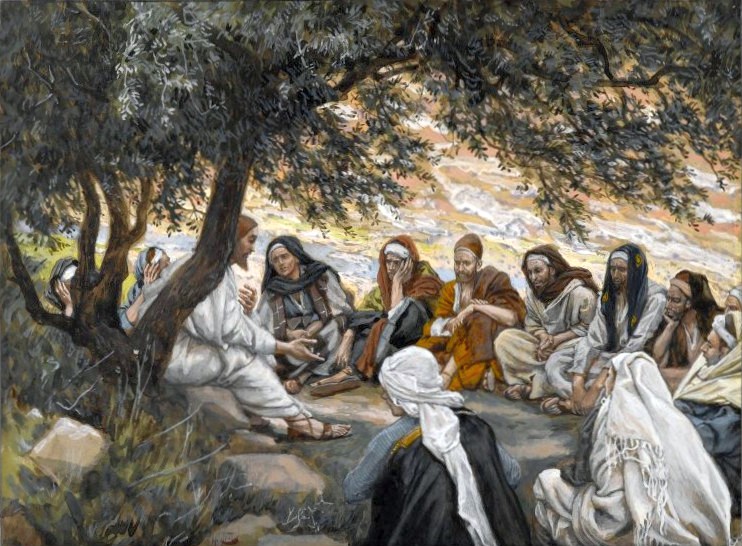
The Way to Glory
02-28-2021Weekly Reflection Fr. Bing ColasitoGod called Abraham to sacrifice Isaac (first reading). God gave His Son for our sake: He who did not spare his own Son but handed him over for us all (second reading). The same Son Jesus: foretold His suffering transfigured to offset the scandal of His crucifixion.
READ MOREWhen Sacrifice Becomes Mundane
02-28-2021StewardshipIt seems to happen every year, like clockwork: we drag a bit, as we enter into the second week of Lent. On Ash Wednesday, we feel a bit like soldiers banging our shields, rushing into battle. “We’re ready, God!” our hearts cry out. “Transform us through sacrifice! Your will be done!”
READ MORE
Conversion: Change of Heart
02-21-2021Weekly Reflection Fr. Bing ColasitoIn the first reading, Noah went into the ark, and God saves him and his family from the flood. God establishes a covenant with Noah, now he and his family will start a new life under this covenant. Peter says God renews ourcovenant with Him through the waters of baptism (second reading). God has given us new life. In the Gospel, Jesus is the new covenant who conquers Satan and all his temptations.
READ MOREThe Unlikely Suspects
02-21-2021StewardshipHave you ever taken a nature walk? Have you leisurely strolled through a forest or field, with no real destination in mind and your only objective being receptivity to and observation of all God’s creation?
Sometimes, Scripture readings can feel like a nature walk. All of salvation history plays out against the backdrop of the natural world, with all elements of God’s creation - plants and animals and the dust of the earth itself - turning in a supporting performance. How about Jesus in the hot and dusty desert, tempted, living “among the wild beasts?” Noah departed from his ark with the animals he rescued, observing God’s sign in the very clouds of the sky. Even God Himself, offering us salvation from original sin through the waters of baptism.
READ MORE
Spiritual Vaccine
02-14-2021Weekly ReflectionLepers in the book of Leviticus should dwell away from the community, cry out unclean, unclean, and must follow the imposed disciplinary actions for leprosy. But Jesus in the Gospel shows pity on the leper and willed Him: I do will it. Be made clean. The second reading's independent theme is: Whatever we do, we shall do for the honor of God, imitating Christ.
READ MOREThe Unfailing Goodness of God
02-14-2021StewardshipI have always wondered why Jesus told the cleansed leper not to publicize how he had been healed by the Son of God. It’s not that I can’t understand why Jesus would want to keep the matter quiet — after all, he knew that as soon as people heard, he would be mobbed with requests for healings, and his movements restricted.
READ MOREMethod 2 - Teaching Lenten Practices
02-11-2021LentExplain Fasting
During Lent, Christians “fast” in various ways to connect with and honor Jesus, who fasted for forty days in the desert. Note that during Lent, “fasting” may not always involve food. There are other ways to practice sacrifice and strive for closeness with God. You don’t have to expect your child to make a huge, symbolic sacrifice for forty days. But you can certainly teach the concept and encourage your child to try it, perhaps by giving up sweets or video games.
This period of fasting is also a good time to show solidarity with people who do not have enough food. Take your child with you to donate to a food bank or serve meals at a shelter.
For Roman Catholic children, the rules for fasting (before age 18) and meat abstinence (before age 14) typically don’t apply, but you, as the parent, may practice that with your children.
READ MOREThe Audacity of Holiness
02-07-2021StewardshipDo you know a holy person? I’m not talking about piety — that’s important, too, in its own way. But right now, I’m speaking of holiness.
St. Therese of Lisieux called holiness “a disposition of the heart that makes us humble and little in the arms of God, aware of our weakness, and confident — in the most audacious way — in His Fatherly goodness.”
READ MORE
Jesus' Mission
02-07-2021Weekly ReflectionJob says: life, especially sickness, is a drudgery. The book of Job deals with the question and problem that many people struggle with: Why does God permit human suffering through death, sickness, and poverty? Up to this time, traditional Jewish belief that God rewards the just and punishes the evildoers. Thus, sufferings were considered a punishment from God. Job did not know much about the life after. God revealed this only at a later time in the Book of Wisdom. And more fully in the New Testament. Job did not understand it, but he will never doubt the justice and fairness of God.
READ MOREMethod 1 - Describing Key Days During Lent
02-03-2021LentExplain Ash Wednesday
Lent begins with Ash Wednesday, which, for many believers, includes a symbolic drawing of a cross with ashes on the forehead. The ashes are meant to remind everyone of human mortality (“remember that you are dust, and to dust you shall return”), but it’s not necessary to push this idea too forcefully on young children. Be matter-of-fact about the tradition - if it helps, talk less about death and more about the cross and it’s meaning.
READ MORE